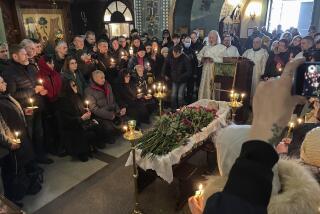In Puzzling Move, N. Korea Postpones Kim Funeral : Surprise: South is astonished. North says rites delayed two days to cope with the large number of mourners.
- Share via
SEOUL — In a move that astonished and puzzled South Korean leaders, North Korea today abruptly postponed a state funeral for President Kim Il Sung from Sunday to Tuesday.
Radio Pyongyang, monitored here, said the decision was made to cope with an increasing number of North Korean mourners who wish to pay their respects to the only leader the Stalinist nation ever knew in its 46-year history. Kim, 82, died of a heart attack July 8.
Kim’s body, encased in a crystal casket surrounded by flowers, has been lying in state in the presidential palace in Pyongyang since Monday night, when his son and heir apparent, Kim Jong Il, 52, led top officials to pay the first round of respects.
Lee Hong Koo, South Korea’s minister of unification, said North Korea may have postponed the funeral “to maximize the feelings of (the North Korean people who want to) cherish the memory of their late leader to smooth the succession of power.”
But he added, “We have no intelligence reports that the transfer of power to Kim Jong Il is in trouble.” He spoke after South Korean Cabinet ministers met to discuss North Korea.
The North Korean Central News Agency said the move reflected the “ardent feelings and demand of the people” to pay respects. “The number of mourners is ever increasing.”
Mourners will be allowed to pay respects through Monday, Radio Pyongyang said. The news agency said the funeral organizing committee, headed by Kim Jong Il, decided to stage a large memorial rally the day after the funeral.
The postponement only a day before the funeral promised to cause major logistic trouble in Pyongyang. No details have been announced about plans for the funeral, but the Communist nation always held extravaganza-proportion celebrations of Kim’s birthdays in which tens of thousands of North Koreans staged performances.
The move came a day after the Japanese government, in a white paper on defense, for the first time called the development of North Korean weaponry a grave threat to Japan.
Japan’s Cabinet approved the long-planned annual defense policy paper eight days before Socialist Prime Minister Tomiichi Murayama is to visit Seoul.
The report said North Korea is believed to have acquired chemical and biological weapons and is suspected of developing nuclear bombs to go along with a proven missile capacity. “The situation on the Korean peninsula has become a grave destabilizing factor for the security of East Asia, including Japan,” the report said.
It noted that in May, 1993, North Korea successfully test-fired a missile with a range of 620 miles, meaning the device would be capable of striking Osaka, Japan. Pyongyang also is believed to be working on a longer-range version that could reach Tokyo and most of the rest of Japan.
“If the development of nuclear weapons is matched by the development of missiles, this could pose a more dangerous situation,” the white paper said.
Hirotsugu Ota, counselor at the Defense Agency in Tokyo, said Japan “would have to consider measures in the future if North Korea went ahead with its missile development.” He did not elaborate, but his statement apparently referred to the development of an anti-missile system. The United States has offered to work with Japan to produce weapons capable of shooting down incoming missiles.
Earlier this year, the Japanese government declared that Tokyo would not seek a nuclear arsenal of its own even if North Korea developed nuclear weapons.
Pyongyang, meanwhile, resumed propaganda attacks on South Korea by condemning Seoul for ordering a military alert immediately after the announcement last Saturday of Kim’s death and for banning its citizens from offering condolences. It compared the alert order with “rashly igniting a fire at a funeral home.”
“Far from sharing sorrow at the unexpected misfortune on the threshold of North-South summit talks, the South Korean authorities abused (Kim’s death) politically and provoked their fellow countrymen (in the North) who have lost the leader of the nation,” the North Korean Central News Agency commented. It said that South Korean President Kim Young Sam, who had been scheduled to meet the North Korean dictator July 25-27 in Pyongyang, “cannot be called a human being, still less a politician.”
More to Read
Sign up for Essential California
The most important California stories and recommendations in your inbox every morning.
You may occasionally receive promotional content from the Los Angeles Times.













